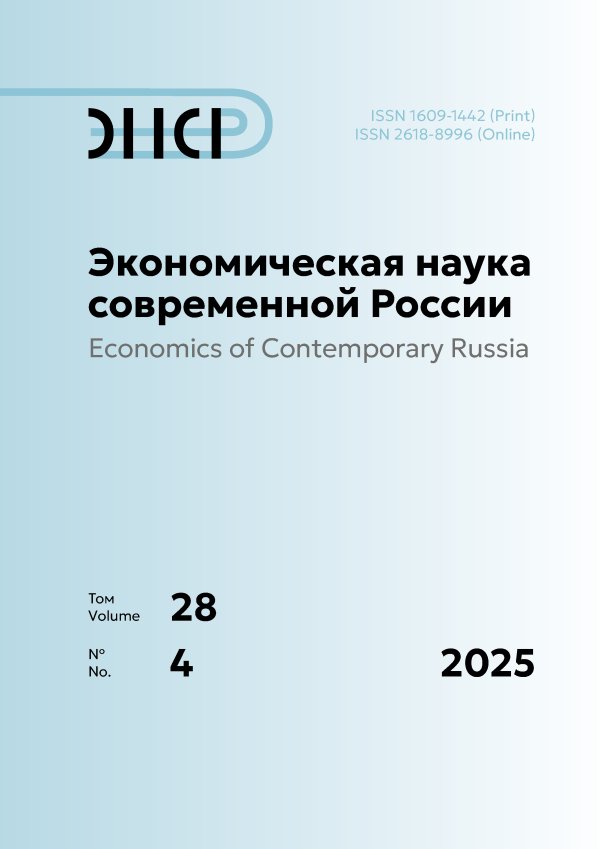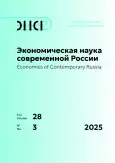Method for Correcting Panel Data Heterogeneity in the Models of Complex Economic Systems
- Authors: Babeshko L.O.1
-
Affiliations:
- Institute of Digital Technologies, Financial University under the Government of the Russian Federation
- Issue: Vol 28, No 3 (2025)
- Pages: 26-36
- Section: Actual problems of economics
- URL: https://journal-vniispk.ru/1609-1442/article/view/333353
- DOI: https://doi.org/10.33293/1609-1442-2025-28(3)-26-36
- EDN: https://elibrary.ru/CJANID
- ID: 333353
Cite item
Full Text
Abstract
The article is devoted to the construction of models for panel data that take into account the influence of qualitative features on the endogenous variable. Dummy variables are an econometric tool that formalizes the influence of qualitative features. The need to include dummy variables in econometric models was recently dictated by structural changes in the economies of a number of countries caused by unprecedented Western sanctions and changes associated with the pandemic. The aim of this study is to develop and empirically test a model of Russia's trade turnover with BRICS countries using panel data techniques that account for the impact of qualitative (time-invariant) factors on the endogenous variable, employing Fixed effects vector decomposition (FEVD) method. FEVD approach provides a more flexible model specification by combining the advantages of fixed and random effects models without relying on the strict assumption of zero correlation between individual effects and regressors, which is typical of random effects models. This enhances the capabilities of panel data analysis in econometrics and enables more accurate modeling of the influence of qualitative factors on the endogenous variable. The objectives of the study include: building models for panel data based on BRICS data, conducting their specification tests, implementing FEVD method algorithm in the R software environment, and algebraic and empirical verification of the properties of the method parameter estimates. The result of the work is adaptation of FEVD method to the specifics of BRICS economies in the context of modern economic challenges. Balanced panel data for five BRICS countries (Brazil, Russia, India, China, South Africa) for the period 2000-2020 were used as an empirical base. Particular attention is paid to the analysis of the impact of macroeconomic indicators (GDP, dollar exchange rate, oil price, pandemic shock, etc.) on Russia's trade turnover with BRICS countries. The FEVD method made it possible to increase the accuracy of the estimation results in comparison with the traditional fixed effects model. The study contributes to the empirical base for estimating fixed effects models using FEVD method.
About the authors
L. O. Babeshko
Institute of Digital Technologies, Financial University under the Government of the Russian Federation
Author for correspondence.
Email: LBabeshko@fa.ru
ORCID iD: 0000-0002-7692-3894
SPIN-code: 7233-2760
Dr. Sci. (Economic), Professor Moscow
References
- Abdixhiku L., Pugh G., Hashi I. (2018). Business Tax Evasion in Transition Economies: A Cross-Country Panel Investigation // The European Journal of Comparative Economics. Vol. 15 (1). Pp. 11-36.
- Breusch T., Ward M. B., Nguyen H. T.M. et al. (2011). On the Fixed-Effects Vector Decomposition // Political Analysis. Vol. 19 (2). Pp. 123-134.
- Chatelain J.-B., Ralf K. (2021). Inference on time-invariant variables using panel data: A pretest estimator // HAL+SHS Id: Halshs-01719835. URL: https://shs.hal.science/halshs-01719835v2
- Chaudhry A., Hyder K. (2012). A Structural VAR Analysis of Pakistan's Textile Export // Middle-East Journal of Scientific Research. Vol. 12 (4). Pp. 464-478.
- Chen H. (2009). The analysis of simultaneous multi equations model on the relationship between trade and economic growth in China // International Journal of Business and Management. Vol. 4 (1). Pp. 162-166. DOI: https://doi.org/10.5539/ijbm.v4n1p162
- Greene W. (2011). Fixed Effects Vector Decomposition: A Magical Solution to the Problem of Time Invariant Variables in Fixed Effects Models // Political Analysis. Vol. 19. Pp. 135-146.
- Hausman J. A., Taylor W. E. (1981). Panel data and unobservable individual effects. Econometrica, vol. 49, pp. 1377-1398.
- Kleiber C., Zeileis A. (2008). Applied Econometrics with R. New York: Springer. 232 p.
- Plümper T., Troeger V. (2007). Efficient Estimation of Time Invariant and Rarely Changing Variables in Finite Sample Panel Analyses with Unit Fixed Effects // Political Analysis. Vol. 15. Pp. 124-139.
- Plümper T., Troeger V. (2011). Fixed-Effects Vector Decomposition: Properties, Reliability, and Instruments // Political Analysis. Vol. 19 (2). Pp. 147-164. URL: http://www.jstor.org/stable/23011259
- Sellner R. (2019). Non-discriminatory Trade Policies in Panel Structural Gravity Models: Evidence from Monte Carlo Simulations // Review of International Economics. Vol. 27 (3). Pp. 854-887.
- World Bank. (2020). World Development Report 2020: Trading for Development in the Age of Global Value Chains. Washington (DC): World Bank.
Supplementary files









